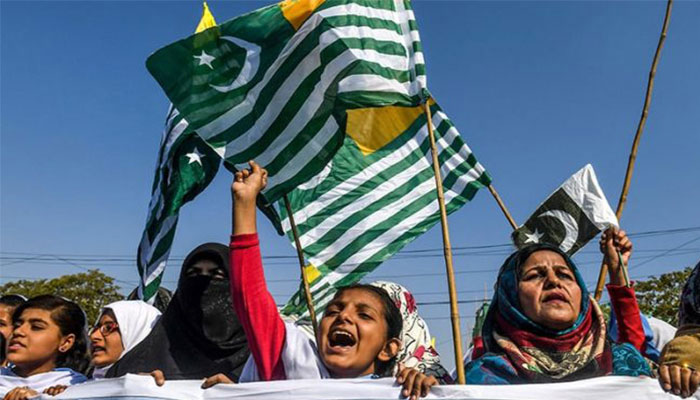The Awami Action Committee (AAC) in Azad Jammu and Kashmir (AJK) emerged as a broad coalition of civil society members—including traders, transporters, lawyers, students, and teachers—united in protest against inflation, electricity costs, shortages of essentials like flour and wheat, and what they see as systemic corruption and elite privilege. Their tactics have included strikes, shutdowns, and negotiations with the AJK and federal governments. A major breakthrough came in May 2024 when the AJK government accepted the AAC’s demands, offering subsidies and cutting elite benefits through a 23 billion rupee package. However, dissatisfaction followed due to the slow or incomplete implementation of those promises.
In 2025, the AAC escalated its movement, issuing 38 new demands and announcing a total shutdown from September 29 if unmet. These expanded demands included not only economic grievances but also political reforms, most controversially the abolition of 12 reserved seats in the AJK Legislative Assembly for Kashmiri migrants from Indian-occupied Kashmir (IIOJK). The AAC argues these seats distort democratic representation. Yet, these seats carry symbolic and constitutional weight. Rooted in the AJK Interim Constitution Act of 1974, they exist to represent refugees from the original state of Jammu and Kashmir, reinforcing Pakistan’s stance that the region remains disputed and that AJK is not a Pakistani province. Removing these seats could undermine Pakistan’s international position on Kashmir, weaken its legal narrative, and alienate displaced communities who maintain strong political, emotional, and economic ties to their ancestral homeland.
Global parallels show that refugee representation in legislative bodies is common. The Palestinian National Council includes diaspora Palestinians; the Tibetan government-in-exile gives representation to Tibetan refugees; and Bosnia and Northern Ireland have adopted mechanisms for marginalized groups. These cases illustrate the broader trend of ensuring symbolic and practical political representation for displaced communities, with AJK’s refugee seats fitting into this pattern.
Another sensitive AAC demand is the removal or reduction of perks and facilities for AJK politicians and officials. While AAC highlights the ethical issue of luxurious lifestyles for elites during widespread economic hardship, experts caution against a complete elimination of security and operational facilities. AJK’s geo-strategic location near the Line of Control makes its leaders high-risk targets, and Indian intelligence operations in the area have long posed threats. Removing protection and essential resources could expose leaders to attacks, hurt Pakistan’s image, and destabilize governance. Analysts argue that instead of abolishing perks, a rational, needs-based system should be introduced, ensuring accountability while preserving necessary infrastructure for effective governance.
Although peaceful protest is a right, using it as a primary tool to pressure the state risks undermining institutional governance. AJK already enjoys benefits like subsidized flour and electricity and receives more federal attention than many Pakistani provinces. With Pakistan facing deep economic challenges, including debt, inflation, and limited fiscal space, it is difficult to meet every demand from every region. If each province or region starts claiming exclusive rights to local resources—like AJK does with hydroelectricity—others could follow suit, demanding similar entitlements based on natural resource production. This could dismantle the concept of a united federation, fueling internal divisions, destabilizing national unity, and inviting external exploitation through propaganda and hybrid warfare.
There is growing suspicion that the AAC might no longer represent genuine public interests. Concerns have emerged that its motives could include personal gain, political point-scoring, and even external influence, possibly from hostile entities like India. Allegations of foreign links, leaked ciphers, and audio recordings suggest connections between some AAC members and Indian intelligence. These claims have shaken public trust. Moreover, the AAC is criticized for ignoring everyday economic exploitation by local market players and failing to speak out against poor-quality goods that affect public health. The movement’s focus on political demands while neglecting basic consumer and health issues has drawn criticism from ordinary citizens.
Further complicating the situation is the infiltration of separatist or anti-state elements into the AAC. These fringe groups have used the platform to promote anti-Pakistan rhetoric, undermining Pakistan’s contributions to AJK’s security, development, and welfare. Despite such narratives, the majority of AJK’s population remains emotionally and politically connected to Pakistan, maintaining loyalty to the state and its institutions, especially the military, which has provided support during conflicts and disasters.
Given these developments, the AAC must distance itself from any anti-state actors and allegations of foreign influence. If innocent, it should publicly refute the accusations and cooperate with investigations. Restoring credibility requires transparency. Instead of resorting to protests and shutdowns, the AAC should engage in constructive dialogue with government representatives, experts, and civil society. The government too must act with maturity, avoiding inflammatory language and showing readiness to negotiate on legitimate issues.
Ultimately, the people of AJK seek peace, progress, and stability—not division or hostility. They have endured the burdens of living in a disputed region and want to focus on development, jobs, healthcare, and education. Political movements must avoid becoming tools of disruption or foreign agendas. National unity, institutional strength, and economic realism must guide reform efforts. Pressure-based tactics, if normalized, will destabilize not just AJK but the entire federation. Only through cooperation, accountability, and honest engagement can the region move forward in a way that benefits both AJK and Pakistan.





Comments are closed, but trackbacks and pingbacks are open.